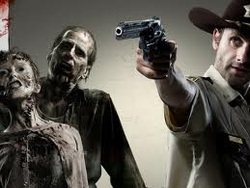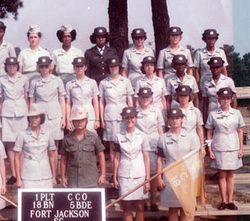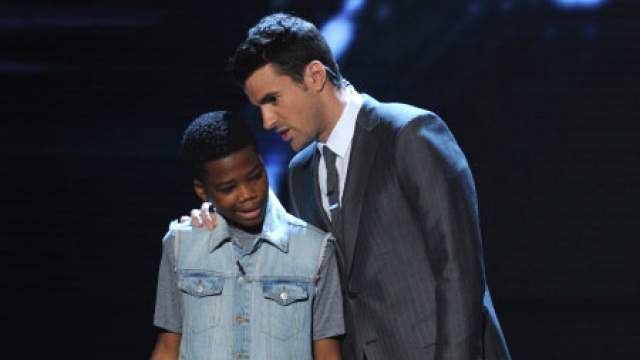 The Sopranos had two groups of fans who, while both loving the HBO drama, often found themselves having “fan fights” on internet forums. Most of these conflicts could be traced to the defining qualities of each group. The “hits and tits” fans were interested in seeing skin and action. The other group was never named (that I know of), but I will loosely call them the “depth” fans as they were interested in the story that was decorated by all the skin and action. From one episode to the next, you could count on reading in the forums either “what’s with all the dreams … why can’t we see a good shooting already?” or “right when we were getting to the Freudian stuff, Chase gives us a bloodbath.” Sometimes the two groups would lodge a complaint over the same scene.
After the last few episodes of The Walking Dead, I see a similar division of fans happening. On one side there are those who are complaining that there has been too much talking and not enough “walking,” or zombie action, for the past six episodes. On the other side are those fans, and I confess that I belong to this group, who believe The Walking Dead’s excellence is in its attention to the living characters and the complexity of the narrative into which they are written.
If The Walking Dead were to be merely a show with survivors killing zombies and zombies eating survivors, it would be nothing more than cheap, very cheap horror. The story AMC has produced is so compelling that even those people who avoid zombies in all their manifestations come back every Sunday night to see how Rick and the core group of survivors will get deal with the next “walker” threat as well as the next internal threat. I can say this because, yes, I am a Walking Dead fan, and yes, I am afraid of zombies.
 Tomorrow is the first of December, the anniversary of many “firsts.” It was the date Dr. Pepper first debuted, and the date of the first successful sexual reassignment surgery. On a sadder note, it was the date for the first draft lottery in the Vietnam War, and the date AIDS was officially recognized as a disease. While I don’t expect it to make it onto any big or even biggish “first” lists, this blog will experience its own first tomorrow – the first of my daily “Top 25 Christmas Episodes” entries.
It’s going to be a slight holiday in my world – slight as in economically depressed, not small by any means. So if you are one of my friends who has come to expect a Cynthia Surprise at Christmas, you’ll have to make do with my blog. It might not be the usual basket of baked goods or piece of handmade jewelry or exhilarating novel, but I promise to make it lively. And it will last so much longer than those Snickerdoodles!
I hope my posts will help you remember a forgotten Christmas episode or introduce you to a new one that might make you laugh, or cry, or wonder “what the holiday hell were they thinking!” The list includes everything from cult favorites to just plain sentimental favorites, plenty for everybody!
So, until tomorrow … “and to all a good night.”
The commentators for the playoff game between the University of North Alabama and Delta State University just informed the radio audience that the UNA chaplain’s pregame talk with the team included references to a Sioux chief who inspired his warriors by reminding them it was a good day to die. Aside from the poor choice in using Native American war cries to inspire a football team, the reference made me giggle a bit. UNA’s mascot is the Lion, while Delta State’s is the Fighting Okra. I have an image in my head of a giant, ugly okra mauling a defenseless lion; I wish the image would go away.
Before there were bills to pay and papers to grade and family to take of, there was the simplicity of being young. Part of that simplicity was marking time on a calendar according to the big events of the year like school starting, school ending, birthdays, the Christmas Holidays, and if you were from Kansas City, the Thanksgiving day lighting of the Country Club Plaza.
For those who haven’t been there, the Country Club Plaza was the first shopping center created to be reached by automobile. Its buildings are all in the Spanish style (it was designed to look like Seville). Aside from being a great destination for a day of strolling, shopping, and eating, “the Plaza” offers the best Thanksgiving evening entertainment in the Midwest, its annual lighting ceremony.
Most cities congregate to watch a Christmas tree lighting. That tree in Rockefeller square, for instance, which might take up a square block of real estate at best. In Kansas City, folks gather to watch as all 55 acres suddenly, with the flick of a switch, are illuminated in the colors of the season.
Residents take the occasion pretty seriously. They vie for the best spots from which to watch. If you want a free experience, you get there very early and stake your claim to a parking spot on a rooftop parking deck. If you have some funds or some friends with funds, you reserve a Plaza-facing hotel room on an appropriately high floor and watch the ceremony over winter cocktails with your favorite people.
It has been almost 20 years since I last watched the Plaza lighting ceremony, and even longer since life was simple enough to put that event on the calendar of life. As we all celebrate Thanksgiving in a couple of days, I hope we all find a simple and illuminated moment of beauty to begin our holiday season.
 Today’s World Lit assignment was Tadeusz Borowski’s “Ladies and Gentlemen, to the Gas Chamber.” In the many years that I have taught this story, I think this is the first time it has fallen on the syllabus the last class period before Thanksgiving. I think I may intentionally schedule it as a Thanksgiving week reading in the future.
Class began with a lot of complaining about my even holding a class meeting. Seems many of my colleagues are on vacation even though school is not officially closed until Wednesday. For some students in the course, mine was the only class they had to meet this week, the only thing preventing them from a full nine day holiday rather than a five day holiday. What can I say? I’m a stickler for rules.
As I put the first lecture slides on the screen, the ones with pictures of Auschwitz, there were still rumblings about being in class. I pointed out the irony of complaining about attending class at the same time as we were reading a work of literature about the Nazi concentration camps, gas chambers and crematoria and all. My students usually feel free to offer a whittyish comeback to such points, but none were offered today. Instead, even those students who didn’t read the short story before coming to class sat in a certain posture of respect for the subjects of Borowski’s narrative.
Today I am thankful for the many reminders of what I (and my students) have to be thankful for. Whether it be Borowski’s autobiographical story of one of the darkest moments in human history, or videos, still painful to watch, of students at UC Davis in the pose of silent protest being pepper sprayed, nothing I am enduring deserves even a mention of complaint.
This comment was included in a long list of responses following a news story on the UC Davis pepper spray incident; “I have seen these in Burma a lot. I am sorry to see America is going down the road like Burma. Shame on YOU.”
Sometimes it takes an outsider to point out the obvious. Countering peaceful protest with violence is, at least since the Civil Rights and Vietnam eras, something America has avoided. The lessons learned from Selma and Kent State seemingly gave America the moral high ground from which to point at the human rights abuses in places like Myanmar (Burma) and shout “Shame on You.”
To those who feel so threatened by the peaceful Occupiers across this county that they must pepper spray the protesters in their mouths and beat them with batons, I wonder what is more important when the eyes of the world are upon you – moving the peaceful protestors by whatever means you find necessary or maintaining at least the semblance of an enlightened position in the world that allows America to exercise some control over human rights abuses elsewhere? Your activities since the beginning of the Occupy movement in general and those at UC Davis in particular make my question rhetorical. And for that, Shame on You.
If a tree falls in a forest and there is no one there to hear it, does it make a sound? If a very talented young performer raps on a stage and there is no one listening, does it make him famous? This is the question young Astro, the 15 year old hip hop contestant on X Factor USA should be thinking about this morning. On last night’s show, Astro and another contestant found themselves in the bottom two spots in the competition, based on audience votes after Wednesday night’s performances, and they both had to sing for survival (after which the four judges would decide who left and who stayed). Astro really showed his ass. He was angry that fans had placed him in the bottom two. Before singing he said, “I really don’t want to perform. I feel like it’s unnecessary.” And his performance illustrated his contempt for the voters. When it was time for the four judges to vote, his mentor L.A. Reid gave Astro a well-deserved scolding for his behavior. Simon Cowell also reprimanded the young performer before casting the final vote. When asked about his disrespect for the audience, viewers, and his own mother, Astro told Cowell, “I feel like if you’re going to put me in the bottom two, I don’t want to perform for people who don’t want me here.” Clearly torn between Astro’s attitude and his aptitude, Cowell finally voted to keep him in the competition. On the way to X, you have to get past a number of other very important letters. C is for competition, which means you are not the only one under consideration for the prize. H is for humble, which means you always remember someone else might be better than you. But H is also for hubris, that overwhelming pride that can be the defeat of even the mightiest competitor – or hero. Our success or failure depends on how well we handle the alphabet of life. It doesn’t matter if it is a five million dollar recording contract at stake, or a college degree, or a job at the local fast food chain, nothing is owed to us just because we might be the most talented or brightest person in the crowd. And A is for ass, which will always shine brighter than even the greatest talent or intellect. Showing it will get you every time. A is for ass. H is for hubris. If these continue to be Astro’s stumbling blocks in the alphabet of life, he may end up being the best rapper ever to take a stage, but there just might not be anyone there to see it.
 One of the most important skills I try to teach my college composition students is to make their language concise. We spend at least one class period each semester taking long, wordy sentences and whittling them down to the least number of words needed to convey the idea. Something really clicks with them when they see a 24 word sentence reduced to a more direct and meaningful sentence of 12 words. They see the discarded words are nothing more than useless crap standing between the reader and the author's point.
Today I will be taking this phrase into my composition classes for their analysis: "It's not a simple yes/no because there are different pieces and I would've gone about assessing the situation differently, which might have caused us to end up at the same place, but I think more could've been done was, what's the nature of the opposition?"
This was Herman Cain’s response to journalists when asked about his position on Libya and his evaluation of Obama’s actions there.
The guru of writing concisely is George Orwell, whose rules for writing included, “If it is possible to cut a word out, always cut it out.” Orwell also said, “Political language... is designed to make lies sound truthful and murder respectable, and to give an appearance of solidity to pure wind.”
If I have taught my students anything, their rewriting of Cain’s response will be a simple, “I don’t know.” All the rest is just useless crap, pure wind, brought to us by Herman Cain, “The New Voice.”
 Penn State’s student newspaper, The Daily Collegian, reported today that an attorney working with some of Sandusky’s victims is questioning the actions of Penn State’s Board of Trustees. Specifically, he suggests that the board did not consider how the abuse victims would be affected by the decision to terminate Joe Paterno rather than allowing him to resign at the end of the year. The effects in question are the reactions of Penn State students to news of Paterno’s termination; the student protests turned JoePa into a victim (not the innocent children Sandusky assaulted), and the attorney places the blame for this on the Penn State Board.
Dostoevsky gave us a character, the nameless narrator of Notes from the Underground, who “couldn’t even become an insect” because that would require action. Underground Man was so conscious, so intellectually aware, that he thought himself out of action each time he considered it. Inaction was the result of overanalyzing the consequences of action.
It seems pretty clear Mcquery and Paterno and Curley and Schultz and Spanier all failed to call police on Sandusky because they worried about the consequences of doing so. Whether it was protecting the university or protecting their own self –interests, the potential effects of taking action appear to be the only explanation for why Sandusky was allowed to continue his predatory assaults on children after the 2002 shower incident. Our outrage is split between Sandusky and the officials who, from bottom to top, “couldn’t even become an insect” by reporting his crimes to the police.
So, it is ironic that this attorney questions Penn State’s decision to fire Paterno because of the potential for student outrage that would turn JoePa into a victim. Yes, the students were wrong, and I can only hope more time at a university will teach them that football is not as important as innocent children. But had the Penn State Board withheld ACTING based on possible fall out, it would have been no better than the long list of people who enabled Sandusky’s crimes because they would not act. In mourning Paterno’s termination, Penn State students may have added to the victims’ pain, but I suggest their pain would have been much greater had the Board of Trustees followed the school’s earlier example and remained paralyzed and useless underground. And I hope those who Sandusky hurt will chose to remember the Penn State students who seem to have gotten a real education after all, the students in AP photographer Gene J. Puskar’s photo that accompanies this blog.
 Veterans Day always creates an emotional roller coaster for me, which is why I didn’t post this yesterday. On the one hand, I feel a deep gratitude for our service veterans, those who have passed and those who are still with us. Among them are many friends and family members who gave diverse service to the nation. My paternal grandfather was on a mine-laying ship in WWI. My paternal uncle was a Marine lieutenant in WWII who hit the beaches at both Okinawa and Guadalcanal. My father served during peace time, and fulfilled his Army duty as an equestrian coach and trainer for the U.S. Pentathlon Team. My husband was a Vietnam-era helicopter pilot.
Veterans Day also brings memories about my own military service, memories I mostly try to avoid. I enlisted in the Army National Guard in the mid-70s and chose a job usually filled by men – actually, it was a job that had always been held by men in my state’s National Guard. I was young, patriotic, and eager to open new territory for women – and mostly I wanted to show that gender should not dictate professional choices. I was also naïve. My experience in the Guard turned into one instance of sexual harassment following another, and another, until I eventually joined the Regular Army just to escape. The full-time military wasn’t much different. The company where I landed had a First Sargent whose response to any issues brought to him by female soldiers was, “All you need is a good man!” If you needed compassionate leave to visit a sick family member or attend a funeral, “All you need is a good man!” If you needed to ask about a discrepancy on your pay stub, “All you need is a good man!” I may have served during peace time, but there was a full-scale gender war going on in the military, and I got caught right in the middle of it.
Veteran’s Day is a reminder to me of my own failure to simply serve my country as a soldier. Of the many battles I have fought in my life and mostly won, fighting an ingrained male military culture so that I could be the best soldier possible was a battle lost. I am thankful for today’s generation of female service members that their experiences are fairer, safer, and more respectful than mine. And this year, I am especially proud that soldiers and those wanting to be soldiers who face another type of gender discrimination, discrimination against homosexuals, no longer must lie in order to show their love of country. At 11:00 on the 11th day of the 11th month of the 11th year of this 21st Century, I made a wish for the all our nation’s military members that their willingness and ability to protect America be their only prerequisite for service and that our country’s military branches never again be an enemy our soldiers, sailors, airmen, and marines must battle.
|











 RSS Feed
RSS Feed